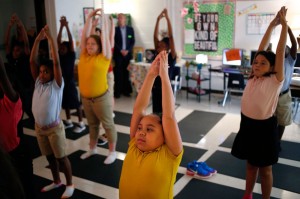The Mindful Classroom
< < Go Back
Some experts think mindfulness is the antidote to distraction, misbehaving–even poor math scores. Are they on to something?
Christina Johnson’s classroom must be the most peaceful place at Cane Run Elementary School in Louisville, Ky. Instead of desks, six rows of black yoga mats line the floor. All the lights are off except for one gently glowing lamp. Underwater sounds gurgle from a pair of speakers.
Today nearly two dozen fifth-graders are sitting on the mats with their shoes off and eyes closed, following Johnson as she guides them through a relaxation exercise. “Take a nice, nice deep breath in, and keep your hands on your anchors, please,” Johnson says. The kids place one hand on their chest, the other on their belly. Johnson taps a chime and the kids know what to do: listen intently, and when the long reverberation stops, their hands shoot up. “Good job,” Johnson says. “We’re ready.”
For the next 45 minutes, Johnson leads the class through exercises that are designed to increase mindfulness–a catchall term for practices that help you focus on the present moment. They learn how to savor the taste of a mint until it dissolves on their tongue; they move their little bodies into poses lifted straight from a yoga studio.
Cane Run, which requires that students attend the class twice weekly from kindergarten on up, is at the frontier of a growing movement. Mindfulness has come to the classroom. At Cane Run, it’s still an experiment: researchers want to know if a program like this can improve students’ focus, behavior, academic performance–even their empathy. A seven-year study, called the Compassionate Schools Project, is under way in 26 Louisville schools. If all goes as well as researchers expect–and if officials can secure the funding–mandatory mindfulness classes will wind up at every public school in the city.
That mindfulness is taking its place alongside math in elementary school says something about the stressed-out state of kids’ brains these days. Educators increasingly believe that mindfulness can be an antidote to three of the biggest mental-health challenges that kids face: anxiety, trouble paying attention and bullying.
More From TIME Magazine:




